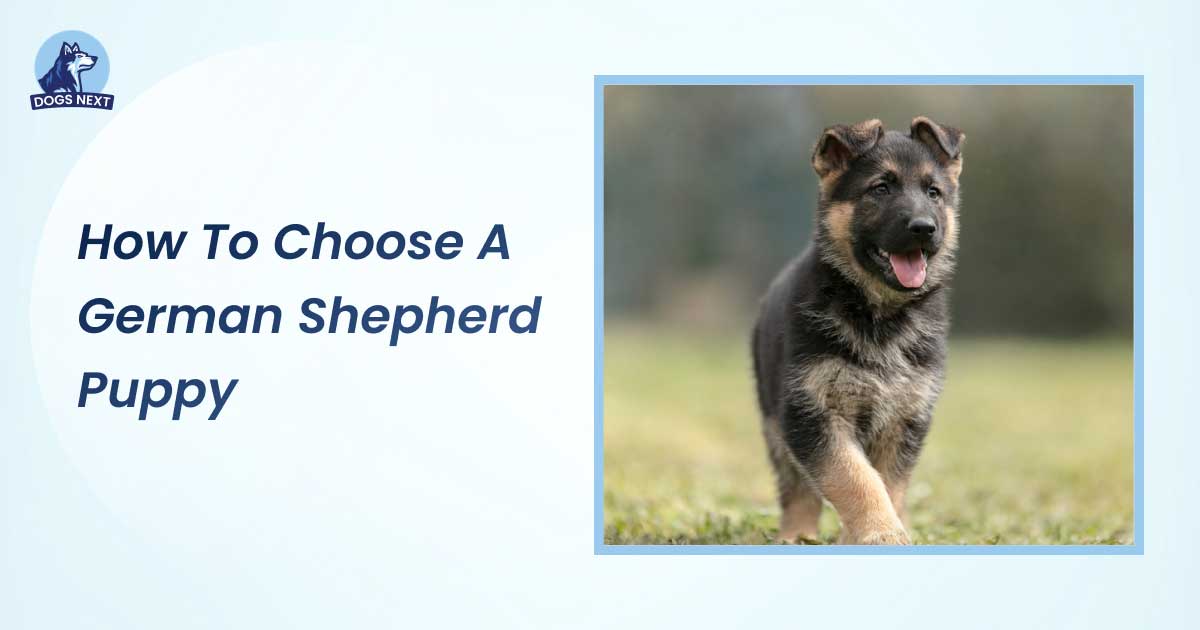To choose a German Shepherd puppy, assess the breeder’s reputation and observe the puppy’s health and temperament. Prioritize a puppy that is active, friendly, and well-socialized.
German Shepherds are intelligent, loyal, and versatile dogs. They make excellent family pets, working dogs, and companions. Selecting the right puppy involves thorough research and careful observation. Visit reputable breeders and ask about health clearances for the puppy’s parents. Check the living conditions and interact with the puppies to gauge their behavior.
Look for a puppy that shows curiosity and confidence without aggression. A healthy appearance, including clear eyes and a shiny coat, is crucial. Ensure the puppy has received initial vaccinations and a clean bill of health from a vet. Your choice will impact your life for years, so take your time and choose wisely.
Understanding The Breed
Choosing a German Shepherd puppy is an exciting journey. Understanding the breed is essential for making the right decision. German Shepherds are intelligent, loyal, and versatile dogs. They come in different lines with distinct characteristics. Knowing these details helps in selecting the perfect companion for your needs.
Characteristics Of German Shepherds
German Shepherds are known for their intelligence, loyalty, and versatility. They are medium to large-sized dogs with strong muscles and agile bodies. Here are some key characteristics:
- Intelligence: Highly trainable and quick learners.
- Loyalty: Strongly bonded to their owners and families.
- Versatility: Suitable for various roles, from family pets to working dogs.
- Temperament: Generally calm and confident.
- Appearance: Distinctive black and tan coat, erect ears, and strong jaws.
German Shepherds are also known for their high energy levels. They require regular exercise and mental stimulation. Without proper activities, they can become bored and destructive. This breed is also known for its protective nature. They make excellent guard dogs and are often used in police and military roles.
Working Line Vs. Show Line
German Shepherds are bred for different purposes, resulting in two main lines: Working Line and Show Line. Each has its own traits and characteristics.
| Aspect | Working Line | Show Line |
| Purpose | Bred for work (police, military, etc.) | Bred for appearance and conformation shows |
| Temperament | High drive, energetic, intense | Calmer, more relaxed |
| Appearance | More muscular, often darker coat | More refined, often lighter coat |
When choosing between the two lines, consider your lifestyle and needs:
- If you need a dog for working roles like search and rescue, opt for a Working Line.
- If you prefer a dog for family companionship and shows, a Show Line might be better.
Both lines are intelligent and loyal, but their energy levels and needs can vary. Selecting the right line ensures a better match for your home and lifestyle.
Credit: goldenridgefarmsgermanshepherds.com
Researching Breeders
Choosing a German Shepherd puppy is an exciting journey. Researching breeders is a crucial step. A responsible breeder ensures a healthy, well-socialized puppy. Learn how to find and evaluate breeders to make the best choice for your new family member.
Finding A Reputable Breeder
Start by identifying reputable breeders. Reputable breeders prioritize the health and temperament of their dogs. They have a solid reputation and positive reviews. Here are some tips to find a good breeder:
- Check breeder directories: Websites like the American Kennel Club (AKC) have breeder directories. These breeders adhere to strict guidelines.
- Ask for recommendations: Talk to veterinarians, local breed clubs, or dog trainers. They often know trustworthy breeders.
- Read online reviews: Look for reviews on forums, social media, and breeder websites. Pay attention to both positive and negative feedback.
Consider the breeder’s experience and specialization. Experienced breeders with a long history of breeding German Shepherds are more likely to have high-quality puppies. They understand the breed’s characteristics and health concerns.
Be wary of breeders who always have puppies available. Reputable breeders often have waiting lists. They breed selectively to ensure the best traits in their puppies.
Questions To Ask Breeders
Prepare a list of questions to ask breeders. This helps gauge their knowledge and commitment. Here are important questions:
- How long have you been breeding German Shepherds?
- Can I meet the puppy’s parents? Meeting the parents gives insight into the puppy’s potential size, temperament, and health.
- What health tests have been done on the parents? Responsible breeders screen for genetic conditions like hip dysplasia.
- Do you provide a health guarantee? A health guarantee shows the breeder’s confidence in their puppies’ health.
- Can I see the living conditions of the puppies? Clean, spacious environments indicate good breeding practices.
- Do you offer support after purchase? Ongoing support is a sign of a responsible breeder.
Take notes during the conversation. Compare answers from different breeders to make an informed decision. Trust your instincts and look for breeders who are transparent and open to questions.
Visiting The Breeder’s Facility
Visiting the breeder’s facility is crucial. Seeing the environment firsthand ensures the puppies are raised in a healthy, stimulating setting. Here’s what to look for during your visit:
- Cleanliness: The facility should be clean and odor-free. Dirty conditions can lead to health issues.
- Space: Puppies need space to play and explore. Cramped spaces can affect their development.
- Socialization: Puppies should be exposed to different people and environments. This helps them become well-adjusted adults.
- Interaction with the breeder: Observe how the breeder interacts with the dogs. Positive, gentle handling is a good sign.
Ask to see where the puppies sleep and play. A responsible breeder will proudly show their facility. Take note of the other dogs’ behavior. Happy, healthy dogs indicate good breeding practices.
Trust your observations and feelings during the visit. A breeder who cares for their dogs will provide a positive environment for raising puppies.
Health Considerations
Choosing a German Shepherd puppy is a big decision. One of the most important factors to consider is the puppy’s health. Ensuring your future pet is healthy will save you from heartache and costly vet bills. Let’s dive into the key health considerations you should keep in mind.
Genetic Testing And Health Screenings
Before bringing a German Shepherd puppy home, ensure the breeder has conducted genetic testing and health screenings. These tests help identify potential genetic disorders that may affect the breed. Here are some essential checks:
- Hip Dysplasia: A common issue in German Shepherds. Ensure the parents are tested for it.
- Elbow Dysplasia: Another joint problem. Check if the breeder screens for this condition.
- Degenerative Myelopathy: A spinal cord disease. Genetic testing can identify carriers.
A reputable breeder should provide documentation of these tests. Always ask for health certificates for the puppy’s parents. This documentation will give you a clear idea of your puppy’s health prospects.
Here’s a quick reference table for essential genetic tests:
| Test | Why It’s Important |
| Hip Dysplasia | Prevents future joint issues |
| Elbow Dysplasia | Avoids elbow problems |
| Degenerative Myelopathy | Identifies spinal disease carriers |
Vaccinations And Vet Checkups
Vaccinations and regular vet checkups are crucial for a healthy puppy. Ensure the breeder follows a proper vaccination schedule. Puppies usually need their first shots at six to eight weeks old.
Important vaccinations include:
- Distemper: Protects against a serious viral disease.
- Parvovirus: Prevents a highly contagious virus.
- Rabies: A legal requirement in many places.
Ensure your puppy has an up-to-date vaccination record. This record helps your vet track your puppy’s health needs. Additionally, schedule regular vet checkups. These visits allow the vet to monitor your puppy’s growth and catch any health issues early.
Here’s a sample vaccination schedule:
| Age | Vaccine |
| 6-8 weeks | Distemper, Parvovirus |
| 12 weeks | Rabies |
| 16 weeks | Booster shots |
Keeping up with vaccinations and vet checkups ensures a healthy, happy German Shepherd puppy.
Credit: www.pinterest.com
Choosing The Right Puppy
Choosing the right German Shepherd puppy is an important decision that will impact your life for many years. Finding the perfect puppy involves understanding various factors such as temperament, energy levels, and the ability to form a strong bond. This guide will help you navigate the process of selecting the ideal German Shepherd puppy for your family.
Assessing Temperament
When evaluating a German Shepherd puppy, observe their temperament closely. A well-balanced temperament is crucial for a happy relationship with your new pet. Here are some key points to consider:
- Confidence: A confident puppy will explore their surroundings and interact with people and objects without fear.
- Socialization: Look for puppies that are comfortable around other dogs and people. They should display curiosity rather than fear.
- Calmness: An overly aggressive or excessively timid puppy may face future behavioral issues. Opt for a puppy that remains calm in various situations.
Spending time with the puppy’s parents can also offer insights into their potential temperament. A table below can help you track these characteristics:
| Characteristic | Observed Behavior |
| Confidence | Explores, interacts |
| Socialization | Comfortable with others |
| Calmness | Balanced reaction |
Energy Levels And Personality
German Shepherds are known for their high energy levels and strong personalities. Understanding these aspects is essential for choosing a puppy that fits your lifestyle. Consider the following:
- Activity Needs: German Shepherds require regular physical activity. Ensure you have time for daily exercise and mental stimulation.
- Personality Traits: Each puppy has a unique personality. Some may be more independent, while others might be more affectionate and clingy.
- Playfulness: Observe how the puppy interacts with toys and games. A playful puppy indicates a healthy, active nature.
Assessing energy levels and personality can help you determine if a particular puppy is a good match for your home environment. Below is a table summarizing these traits:
| Aspect | Observation |
| Activity Needs | High energy, requires exercise |
| Personality Traits | Varies from independent to affectionate |
| Playfulness | Interacts well with toys |
Bonding With The Puppy
Forming a strong bond with your new German Shepherd puppy is essential for a happy relationship. Here are steps to help build that bond:
- Spending Quality Time: Dedicate time each day to interact and play with your puppy.
- Positive Reinforcement: Use treats and praise to encourage good behavior and build trust.
- Training Together: Training sessions are a great way to bond and establish a strong relationship.
Early bonding activities set the foundation for lifelong companionship. A table below highlights key bonding activities:
| Activity | Benefit |
| Quality Time | Strengthens relationship |
| Positive Reinforcement | Builds trust |
| Training | Enhances communication |
By focusing on these aspects, you will build a strong, lasting bond with your German Shepherd puppy.
Preparing For The New Puppy
Choosing a German Shepherd puppy is an exciting journey. Preparing for the new puppy is crucial to ensure a smooth transition. This guide covers everything you need to know to get your home ready for your new furry friend.
Essential Supplies
Before bringing your German Shepherd puppy home, gather all the essential supplies to make the puppy feel comfortable and loved. Here is a list of the basic items you will need:
- Food and Water Bowls: Stainless steel or ceramic bowls are easy to clean and durable.
- Puppy Food: Choose high-quality puppy food specifically formulated for German Shepherds.
- Crate: A crate provides a safe space for your puppy to rest and sleep.
- Bed: A comfortable bed helps your puppy feel secure in their new home.
- Collar and Leash: Ensure the collar fits well and the leash is sturdy.
- Toys: Interactive toys keep your puppy entertained and help with teething.
- Grooming Supplies: Brushes, nail clippers, and shampoo are essential for maintaining your puppy’s coat and nails.
- Training Pads: These help with potty training your new puppy.
- Cleaning Supplies: Accidents happen, so have pet-safe cleaning products ready.
Here’s a quick glance at the essential supplies:
| Item | Description |
| Food and Water Bowls | Durable and easy to clean |
| Puppy Food | High-quality, breed-specific |
| Crate | Safe resting place |
| Bed | Comfortable and secure |
| Collar and Leash | Proper fit and sturdiness |
| Toys | Interactive and teething-friendly |
| Grooming Supplies | Brushes, nail clippers, and shampoo |
| Training Pads | Helpful for potty training |
| Cleaning Supplies | Pet-safe cleaning products |
Puppy-proofing Your Home
Puppy-proofing your home is essential to keep your new German Shepherd safe. Puppies are curious and will explore every nook and cranny. Follow these steps to make your home puppy-friendly:
- Secure Cords and Wires: Hide or cover electrical cords to prevent chewing.
- Remove Hazardous Items: Keep cleaning supplies, medications, and small objects out of reach.
- Block Off Unsafe Areas: Use baby gates to restrict access to stairs and dangerous rooms.
- Check for Small Openings: Ensure there are no gaps or holes where your puppy can get stuck.
- Secure Trash Bins: Puppies love to explore trash, so use bins with secure lids.
- Store Valuables Safely: Keep shoes, bags, and other chewable items out of reach.
- Outdoor Safety: Ensure your yard is fenced and free from harmful plants and chemicals.
Here are some quick tips for puppy-proofing:
- Hide electrical cords
- Store cleaning supplies safely
- Use baby gates for restricted areas
- Secure trash bins
- Ensure the yard is fenced
Creating a safe environment ensures your German Shepherd puppy can explore and grow without harm.
Frequently Asked Questions
What Should I Look For When Buying A German Shepherd Puppy?
Check for health clearances, strong temperament, and good socialization. Verify reputable breeders, and ensure parents have stable behavior.
How Do You Pick A German Shepherd Puppy?
Choose a reputable breeder. Observe the puppy’s health and temperament. Look for clear eyes and clean ears. Ensure the puppy is social and energetic. Verify vaccination records and pedigree.
How Can You Tell The Quality Of A German Shepherd Puppy?
Check for strong bones, clear eyes, and a healthy coat. Observe temperament and energy levels. Ensure reputable breeders provide health clearances.
How Do I Pick The Best Puppy From A Litter?
Observe the puppies’ behavior and health. Choose one that is friendly, active, and curious. Check for clear eyes, clean ears, and a shiny coat. Ensure the puppy is comfortable with human interaction. Consult the breeder for temperament insights.
Conclusion
Choosing a German Shepherd puppy requires thoughtful consideration. Ensure you evaluate temperament, health, and breeder reputation. By doing thorough research and asking the right questions, you’ll find a loyal and loving companion. Remember, a well-chosen puppy brings joy and security to your home for years to come.
Happy puppy hunting!

I’m David, an expert contributor and writer, with two furry friends of my own, I know the challenges of raising and caring for dogs. From training to nutrition and health, my goal is to provide valuable insights and advice to help create strong bonds and happy, healthy lives. Find me in Twitter.




